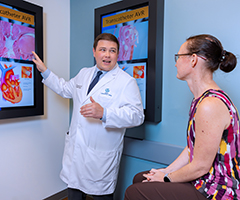Cardio-Oncology
What is cardio-oncology?
Cardio-oncology is one of the most rapidly growing specialties across the national and international healthcare sphere. The number of programs, educational courses and scientific publications is increasing dramatically. Fellowship training programs and guidelines from multiple cardiovascular and oncologic societies are emerging and providing best practice strategies.
Patients with cancer may have a higher risk of developing cardiovascular disease since cancer therapies may affect the heart and vascular systems. It is important to prevent, monitor, and treat cardiovascular disease in cancer survivors and patients to ensure long-term health.
Our cardio-oncologists have advanced training and have dedicated themselves to learning more about how cancer therapy affects the heart. Collaborating with other cardiologists and oncologists provides comprehensive cardiovascular care to patients with cancer who have, or are at risk for, heart disease.
We seek to evaluate patients so that cancer therapy can be aggressive -- and to ensure that cardiac disease is not the result of that aggressive therapy.
-
Cardiology - Heart Institute at Medical Plaza One
-
Cardiology - Heart Institute at Coconut Point
-
Cardiology - Heart Institute at Metro Parkway
Our Cardio-oncology Program Goals
- Ensure better outcomes for patients with heart disease and cancer
- Recognize early cardiotoxicity from therapy
- Prevent, reduce, and if possible, reverse cardiac damage
- Monitor patients with potential cardiac issues undergoing chemo or radiation therapy
- Understand cardiac issues during cancer therapy
- Remove cardiac disease as a barrier to effective cancer therapy
- Participate in establishing best survival practices for cardiac surveillance after therapy
Who is this for?
The focus is on three groups:- Those with existing heart disease who develop cancer to ensure their heart can withstand the stress of treatment. All these patients need to see their cardiologist to be referred.
- Those who are considered cancer survivors and have either undergone radiation therapy with portals that have included the heart or received cardiotoxic regimens.
- Those currently undergoing chemotherapy with cardiotoxic agents to monitor for subtle changes in cardiac function that may signal an early decrease in cardiac function.
What cardio-oncology treatments do we provide?
Risk Assessment
Before undergoing medical or surgical treatments for cancer, it is important to understand your risk of developing cardiovascular disease. We work closely with your oncologist and provide a comprehensive evaluation before cancer therapy to minimize any potential cardiovascular complications from cancer treatment. We combine a complete, personalized assessment with appropriate diagnostic testing and optimal cardiovascular therapies.
Care for Cancer Patients with Existing Cardiovascular Disease
Management of conditions such as hypertension, coronary artery disease, congestive heart failure, heart valve disease, and arrhythmias (abnormal heart rhythms) in cancer patients requires an approach customized to their overall care. Our goal is to treat existing cardiac conditions so that you are healthy enough to respond well to your cancer treatment.
Monitoring for Cardiac Complications from Cancer Therapy
If you are actively receiving chemotherapy or have previously completed chemotherapy and/or radiation therapy, you may experience symptoms related to hypertension, coronary artery disease, congestive heart failure, valvular heart disease, pericardial disease, and arrhythmias. With early recognition and treatment, many complications of chemotherapy and/or radiation therapy can be managed successfully.
Assessment of Long-Term Cardiac Risk in Cancer Survivors
There is increasing evidence that shows that survivors of cancer face higher risks of cardiovascular disease. We provide a comprehensive risk assessment that includes a detailed history, physical examination, lab work, and diagnostic testing. Strategies to reduce cardiac risk include dietary and lifestyle modifications and, when appropriate, medical therapy.
Assessment of New Chemotherapies
Many of the new chemotherapeutic agents in clinical and pre-clinical studies have the potential to damage the heart. We administer advanced diagnostic tests to identify cardiotoxicities for patients undergoing treatment with new chemotherapies. These may include diagnostic imaging, noninvasive stress testing, blood tests, ambulatory blood pressure monitoring and continuous monitoring of a patient’s heart from a remote location can help identify cardiotoxicities and lead to the development of preventative strategies.
Evaluation of Cardio-Toxicity
At Lee Health, we have advanced ultrasound imaging including 3D and cardiac strain imaging to detect subtle changes in the heart before they become clinically evident which is crucial for cancer management. In our evaluation we are looking at the effects of cancer therapy on the cardiac tissue, structures, blood supply, and system function.
Learn More About Our Imaging Technology
-
Myocardial Strain Imaging
Learn more about this non-invasive test that allows doctors to take pictures of your heart and identify subtle changes in heart function.
-
Cardiac Imaging
Lee Health Heart Institute offers advanced cardiac services that utilize cutting-edge AI imaging technology. Our expert team provides accurate and efficient diagnostic evaluations for comprehensive cardiac care. Contact us today!
-
Three-dimensional (3D) Echocardiogram
Ultrasound-enhancing agents in echocardiography are frequently and widely used in cardiology. Learn more here about 3D echocardiography techniques offered at Lee Health. Our facilities are in Fort Myers, Cape Coral, and Estero.
What You Should Know
- Heart disease and cancer have shared biology and risk factors
- It is well established that cancer survivors die of cardiovascular disease in greater numbers than recurrent cancer
- The number of cancer survivors is increasing dramatically and the majority of those are over 65 (the so-called silver tsunami of cancer care).
- The number of novel cancer agents is extraordinary both in their efficacy and their adverse cardiovascular effects which necessitates a strategy to care for these patients during active treatment and beyond
- Childhood cancer treatments have lasting cardiac effects, these patients need to be monitored lifelong
- Data exists to demonstrate that patient care, patient and provider satisfaction, and Quality of Life for cancer patients are all increased with a coordinated Cardio-Oncology program, while costs and interruptions in cancer therapy are lowered with such programs.

